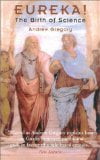 Eureka!: The Birth of Science
Eureka!: The Birth of Science
by Andrew Gregory
Icon Books UK, £6.99, ISBN 1840463740
Books on philosophy are often encyclopeadic and hard to digest, interesting but boring; those on philosophy of science or on logic even more so. Fortunately, this book suffers none of these faults.
Gregory takes us on a tour from the early beginnings, when the world was explained by myths, to the first people who dared to question those myths and laid the foundations for what today is called science.
Myths were rejected and replaced by hypotheses and theories that had to be verifiable. Choosing the best myth is a matter of taste, but then how to decide which is the best hypothesis when several are offered? Gregory describes how the tools to make that difference were developed: logic, and the notions of proof. How may we differentiate them from false proof, false logic and sophism? What made the ancient Greeks unique? Other civilizations, the Babylonians and the Egyptians, also had highly developed technologies but no science. The chapter on Euclid and geometry clearly illustrates the differences between science and technology. All this is exposed in an agreeable narrative style. Why did the Greeks develop science while other cultures stuck to technology? Probably the absence of a strong, organised religion allowed them to question the myths about the creation of the world, the why and the how of natural phenomena, the movement of celestial bodies, the shape of the Earth, the origins of diseases, and to consider different explanations. They could attack claims of magic and distinguish the natural from the supernatural; they even dared to state that magic and the supernatural do not exist, that the world is comprehensible and can be explained in a rational manner. It did not always go unpunished as Socrates experienced. They were not always right. Sometimes they very understandably took the wrong path, by lack of knowledge. They also gave us holism (Aristotle) and it took some 2,000 years before reductionism gave a new impulse to the advancement of science.
The first chapters give an overview of the evolution in thinking. Then separate chapters go deeper into astronomy and astrology, into medicine and the life sciences,into biology and alchemy.
The great quality of this book is that it reads like a novel and is (yes!) holistic in its approach. Highly recommended.



